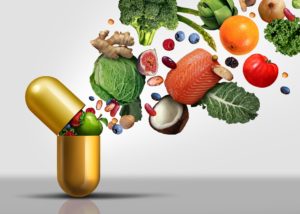
Antioxidant is an umbrella term to encompass compounds that protect cells from potentially harmful free radicals. In the body, free radicals are linked to signs of aging and chronic disease. It works a little like this:
Free radicals are incomplete atoms that look to bond with other atoms to become complete. The problem is that they are indiscriminate in what molecules they bond with, and therefore become unstable. When oxygen molecules split into single atoms that go unpaired, they seek other atoms and molecules to bond with, producing something called “oxidative stress.”
Oxidative stress is believed to damage the body’s cells, leading to signs of aging and disease. Antioxidants, on the other hand, bond with incomplete atoms to prevent or reduce oxidative stress, thereby potentially reducing the symptoms of aging and lowering the risk of illness.
There are a bunch of compounds, nutrients, vitamins, and minerals with antioxidant qualities. Some common ones include vitamin C, vitamin E, selenium, magnesium, and calcium. But there are countless others—some are classified as “phytochemicals” like anthocyanin and proanthocyanidin (found in purple, red, and blue grapes and may help protect from genetic mutations and heart disease). Other phytochemicals include:
- Ellagic acid (berries) may help prevent genetic mutations
- Kaempferol (dark green veggies) help dilate blood vessels
- Lutein (dark leafy greens) aid eye health
- Catechins (green tea, sweet potatoes, orange veggies) that can block cell damage
- Mangiferin (mangos) that may block cell damage, lower diabetes risk
And that’s only some of them! The good thing is that they are available in easily accessible foods in your local grocery store’s produce section. Eating a wide variety of colorful fruit and vegetables, nuts, legumes, and whole grains can ensure you’re taking in plenty of antioxidants to combat free radicals and promote anti-aging in various incarnations.